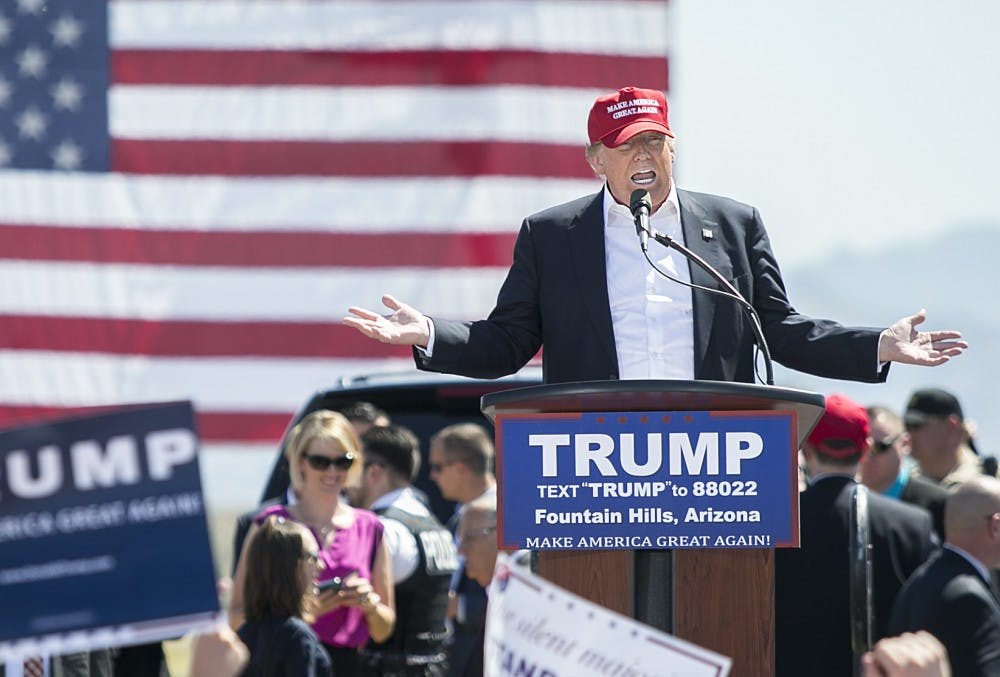With the reality of a new presidential administration under President-Elect Donald Trump looming in the near future, many are curious as to whether Trump can actually follow through completely with his controversial plan for his first 100 days in office.
These types of questions were contemplated and discussed Tuesday at the “Constitutional Limits on Executive Power: Recurring Issues Facing Congress and the New Administration” discussion facilitated by former Republican Senator Jon Kyl and ASU Professor Paul Bender.
“When we initially planned to do this program, we thought we would have the kind of issues that we would’ve expected from a Hillary Clinton presidency and a probably Republican congress,” Bender said.
Bender said Trump’s promises for the beginning of his presidency breed some issues that will likely be seen and experienced by Congress.“The president-elect announced a lot of things he wants to do — both right away and within his first 100 days,” he said. “A number of those bred serious separation of powers issues. To what extent does the president have the power to do things on his on her own without the approval or direction of the Congress?”
Kyl, on the topic of presidential power versus congressional power, said the scale has lately been tipping in favor of the commander-in-chief.
“I think (executive power) is an increasing thing,” he said. “Bush pushed it a little further than some had. We have a lot more fear from presidential authority than congressional authority.”
Kyl said the example shown by recent presidencies has indicated that impeachment is becoming less and less of a likely event.
“Impeachment — that's a big deal for the Congress,” he said. “But as it turns out, impeachment of really high officials is very unlikely, let alone the impeachment of a president. What seemed like a real check and balance at the time … has not turned out to work so well in practice.”
The same is also becoming true when it comes to sending soldiers overseas, further indicating a shift in governmental power in the modern age, Kyl said.
“More and more in modern times, the president has decided when to send U.S. military forces into some kind of action, and he hasn’t necessarily called war,” he said. “The George Bush actions that were taken in Iraq for example … Congress’ power has been diminished, the president’s power has been advanced.”
On the topic of Trump’s desire to pull out of the 2015 nuclear deal with Iran, Kyl said it’s a matter easier said than done.
“Theoretically, he can; practically, he won’t be able to,” he said. “If the president had declared this deal with Iran a treaty, and if two-thirds of the Senate had approved it, that’s it. That’s the law of the U.S."
However, Kyl said the deals that have been in effect for a long time will also take a lot of effort to undo.
“President Obama has changed the facts on the ground,” he said. “He has dramatically changed the situation from before the day the deal was done. The president-elect could say ‘now I’m un-signing this’ and the effect… could well be next to nil. This gets complicated really fast, and it’s not easy to just pull out of the deal.”
However, Kyl said it’s a lot more likely that the president-elect can cleanly back out of the climate change deals established by President Barack Obama in 2013.
“The climate change agreement was just a bunch of promises that they would do stuff,” he said. “My guess is we’re not the only one who’s under those obligations. If President-elect Trump says, ‘I don’t recognize any U.S. obligation to do all of that,’ I don’t know how the obligation could be opposed on the United States. So he could probably pull us out of that, and I don’t know of any of the consequences to that.”
Kyl also said Trump’s promise to ban massive amounts of illegal immigrants is unrealistic within the 100 day time constraint.
“You can’t remove everybody at once,” he said. “The process does take time.”
Chase Turrentine, a senior law student, shares the same sentiment and said Trump’s immigration plan will likely not work because it is difficult to locate illegal immigrants.
“That’s not going to happen,” he said. “Generally, you only come across illegal immigrants when they’ve committed a crime. If people aren’t committing crimes, they’re going to be very difficult to to track down and deport, and more than that, if they’re not committing crimes, why would we even bother?”
Turrentine said Trump’s overall ability to exercise the powers necessary in making his promises a reality largely depends on the behavior of congress.
“For the last eight years or so, the congressional Republicans have derided President Obama’s use of the executive order and his liberal use of them,” he said. “In order for Trump to get what he wants done, he’s either going to have to have a Republican Congress that’s just going to acquiesce to what he wants, or Trump is going to have to use executive orders to accomplish his mission.”
Reach the reporter at angel.n.mendoza@asu.edu or follow @angelnikolas96 on Twitter.
Like The State Press on Facebook and follow @statepress on Twitter.





